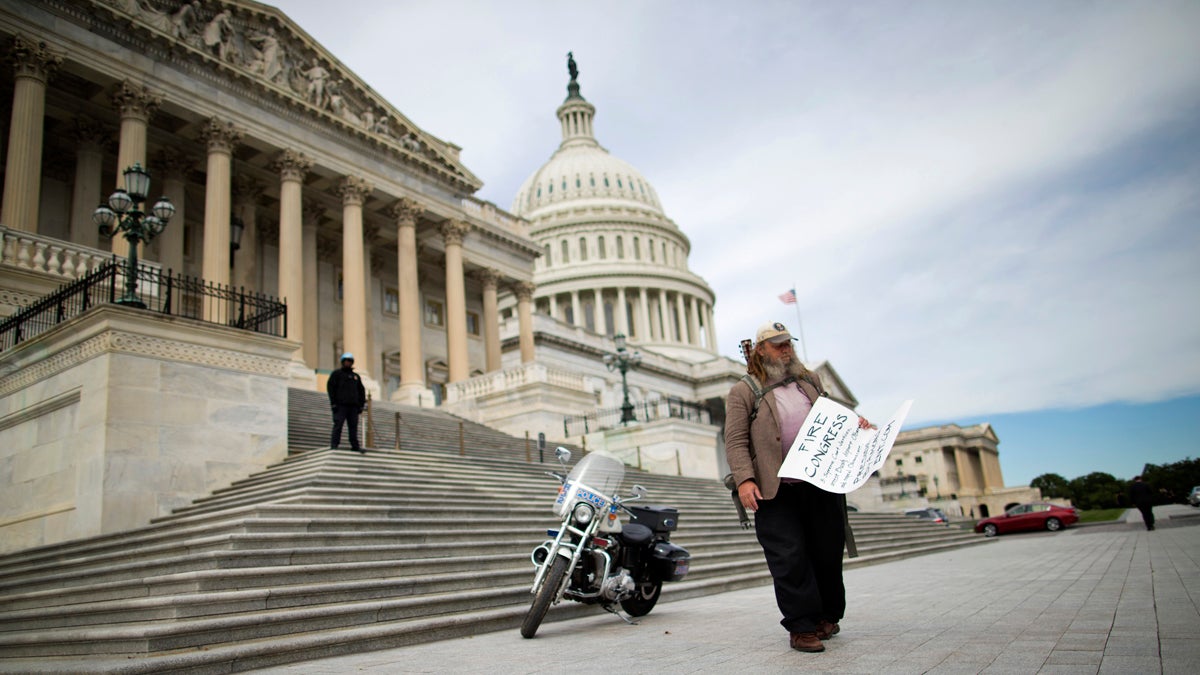Most Americans will yawn at 2014 midterm electionszzzzzz

Rick Hohensee of Washington holds a 'Fire Congress' sign near the House steps on Capitol Hill in Washington, Tuesday, Oct. 8, 2013 (Evan Vucci/AP Photo)
Those of us who closely follow politics would do well to remember that most Americans are turned off and tuned out – especially in this midterm election year. And that’s a symptom of a seriously sick democracy.
We’re on track for record-low midterm turnout this November, at least based on the voting evidence collected thus far. According to a new report by the non-partisan Center for the Study of the American Electorate, turnout in the first 25 statewide primaries was so anemic – down 18 percent from the early primaries in 2010 – that we’re “likely to witness the lowest midterm primary turnout in history.” These numbers “reflect how deeply citizens are turning away from political engagement.”
Yes, Democrats are ill-enthused this year, and the tepid turnout in Democratic primaries bears that out. But the supposedly energized GOP isn’t living up to its billing, either. Republican turnout in GOP primaries is down 15 percent from 2010, the peak year of the tea-party wave. The inescapable conclusion is that a record-high percentage of Americans are poised to voice their disgust at the political system by staying home in November.
The reasons should be obvious. Bill Galston, a senior fellow at the Brookings Institution and a former Clinton White House adviser, tells NPR, “Gridlock is at an all-time high. The productivity in Congress is at an all-time low, and many Americans are asking themselves, ‘How much difference does it make who the people are, and what the party balance is, if nothing seems to change, election after election?” (He’s right about the gridlock; as The Washington Post recently reported, “The Senate went three months this spring without voting on a single legislative amendment.”)
And right now, nothing better illustrates that gridlock than the rhetorical gamesmanship over “impeachment.” The GOP’s agitators – people like Michele Bachmann, Louie Gohmert, Sarah Palin – keep talking it up, and 57 percent of rank-and-file Republicans support the talk. Meanwhile, Democrats are content to exploit the usual Republican overreach, by talking up the talk in order to raise money. Bottom line: Both sides love to run their mouths, because talking is way easier than getting stuff done.
But beyond the current news cycle, most Americans are turned off by the systemic headaches that continue to plague us. Here’s a key lengthy passage in the new report.
Contributing factors to the decline in (voter) motivation are not hard to find: campaigns that are run on scurrilous attack ads that give the citizen a perceived choice between bad and awful; one major party situated far to the right of the American center and the other without a clear and durable message; a decline in faith that government will address major societal need exacerbated by those whose politics seek to accomplish just that; a majority of the young growing up in households in which their parents don’t vote and a larger majority who hear no discussions of politics or public affairs; inadequate civic education in the schools; the fragmenting effects of modern communications technology that has made grazing the Internet a substitute for reading the news, preoccupation with one’s I-phone and its narrow personal community at the expense of interpersonal discussion and participation in a broader community; increased inequality that has the collateral effect of reducing hope for those at the bottom; the rise of libertarian and consumerist values at the expense of values that would promote community and collective engagement, the reduced coverage of politics in the visual media, to name but a few.
That’s “but a few?” You mean there’s more?
With respect to the first listed factor – “scurrilous attack ads that give the citizen a perceived choice between bad and awful” – it’s noteworthy that the abysmal primary turnout coincides with an unprecedented outpouring of negative ads, bankrolled by outside groups, and projected to hit a record $2 billion by November. (For this air pollution, we can again thank the five Republicans on the U.S. Supreme Court, for their Citizens United ruling.) Somehow the electorate just hasn’t been turned on by the negative ad blitz – which is probably the blitzers’ goal; if most folks stay home, only the ideologues will show up to vote.
Indeed, the new report warns that unless the average mainstream citizen becomes re-engaged, our elections (particularly the primaries) will be ever-increasingly dominated by those ideologues. And that scenario will turn people off even more.
Alas, the report is short on doable solutions. (Aren’t we all?) However, it does believe that many of our woes can be eliminated “if the United States emulated Mexico in creating a biometric national identification card and system,” which would “automatically enfranchise” the 61 million Americans who are unregistered yet eligible to vote.
OK, I’ll go way out on a limb and predict that America will win the World Cup long before it ever cops a policy from the likes of Mexico. A biometic ID card? Rest assured, the House GOP would draft a bill to stop that idea from crossing the border.
Follow me on Twitter, @dickpolman1, and on Facebook.
WHYY is your source for fact-based, in-depth journalism and information. As a nonprofit organization, we rely on financial support from readers like you. Please give today.

